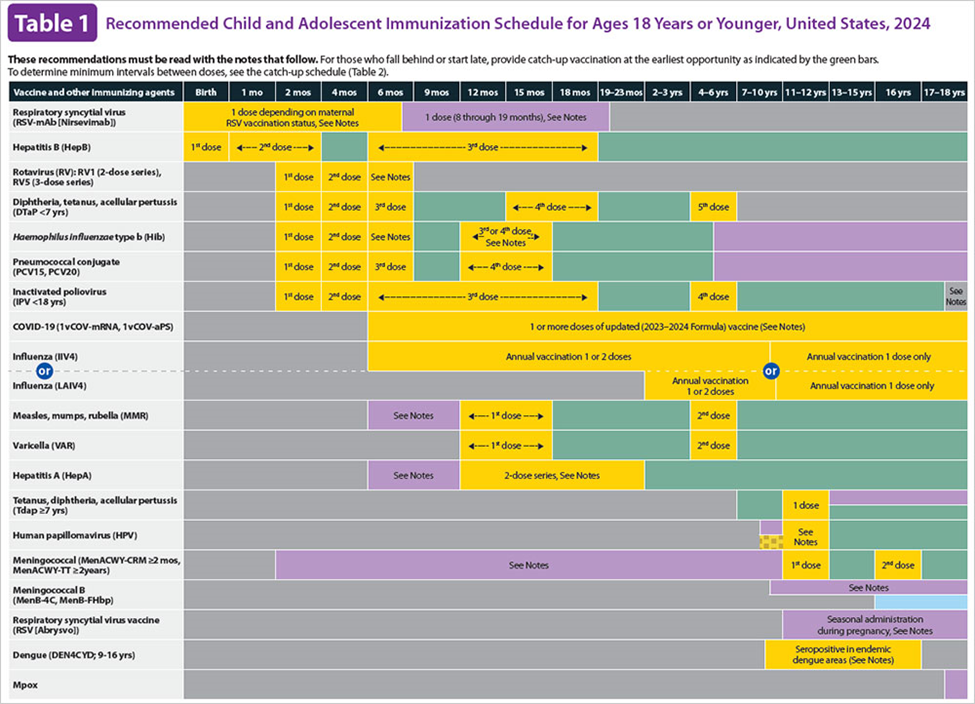A nurse is preparing to administer vaccines to a 4-month-old infant. Which of the following vaccines should the nurse plan to administer?
Influenza
Rotavirus
Measles, mumps, rubella (MMR)
Varicella (VAR)
The Correct Answer is B
A. Influenza:
The influenza vaccine is typically administered annually starting at 6 months of age. It helps protect against seasonal influenza viruses and is usually recommended during the fall or winter months.
B. Rotavirus:
The rotavirus vaccine is routinely administered to infants starting at 2 months of age, with additional doses given at 4 and 6 months of age. It helps prevent rotavirus infection, which can cause severe diarrhea and vomiting in infants and young children.
C. Measles, mumps, rubella (MMR):
The MMR vaccine is typically administered around 12-15 months of age, with a second dose given at 4-6 years of age. It helps protect against measles, mumps, and rubella, which are contagious viral infections that can cause serious complications.
D. Varicella (VAR):
The varicella vaccine, also known as the chickenpox vaccine, is usually administered around 12-15 months of age, with a second dose given at 4-6 years of age. It helps prevent chickenpox, a highly contagious viral infection characterized by a rash and fever.

Nursing Test Bank
Naxlex Comprehensive Predictor Exams
Related Questions
Correct Answer is D
Explanation
A. Broth:
Broth is not typically recommended for children with acute diarrhea because it lacks the necessary electrolytes to adequately replace those lost through diarrhea. While it can help provide some fluids, it may not be sufficient for rehydration and could potentially worsen dehydration if electrolytes are not adequately replaced.
B. Apple juice:
While apple juice may seem like a hydrating option, it is not the best choice for children with acute diarrhea. Apple juice contains a high amount of sugar, which can draw water into the intestines and worsen diarrhea. Additionally, it lacks the necessary electrolytes needed for rehydration.
C. Cherry gelatin:
Cherry gelatin is not recommended for rehydrating a child with acute diarrhea. Like apple juice, it contains sugar, which can exacerbate diarrhea by drawing water into the intestines. Gelatin also lacks the electrolytes needed to replace those lost through diarrhea.
D. Pedialyte:
Pedialyte is the preferred choice for rehydrating a child with acute diarrhea. It is specifically formulated to replace lost fluids and electrolytes and is less likely to worsen diarrhea compared to sugary beverages like juice or gelatin. Pedialyte helps prevent dehydration by providing a balanced mixture of water, sugar, and electrolytes, making it an effective choice for managing diarrhea in children.
Correct Answer is A
Explanation
A. "My belly doesn't hurt anymore."
- This statement is concerning because sudden relief from severe right lower quadrant pain in a child with a history of nausea, vomiting, and suspected appendicitis may indicate a rupture or perforation of the appendix. When the appendix ruptures, there may be a temporary alleviation of pain due to the release of pressure. However, this situation is critical and requires immediate medical attention to prevent further complications such as peritonitis or sepsis.
B. "I am hungry and thirsty."
- While it's normal for a child to feel hungry and thirsty, especially if they have been experiencing nausea and vomiting, this statement is not necessarily concerning on its own. However, in the context of suspected appendicitis and severe right lower quadrant pain, it's important for the child to remain NPO (nothing by mouth) to prevent complications in case surgery is needed.
C. "I'm tired and want to take a nap."
- Feeling tired and wanting to rest is not uncommon, especially if the child has been experiencing discomfort or pain for a prolonged period. While this statement may indicate fatigue, it's not inherently concerning in the context of suspected appendicitis. However, it's important for the nurse to monitor the child's energy level and overall condition.
D. "I am scared and I want to go home."
- It's understandable for a child to feel scared or anxious, particularly when facing a medical procedure such as surgery. While this statement reflects the child's emotions, it doesn't necessarily indicate a change in their medical condition. However, it's important for the nurse to address the child's fears and provide emotional support while ensuring that the child receives appropriate medical care.
Whether you are a student looking to ace your exams or a practicing nurse seeking to enhance your expertise , our nursing education contents will empower you with the confidence and competence to make a difference in the lives of patients and become a respected leader in the healthcare field.
Visit Naxlex, invest in your future and unlock endless possibilities with our unparalleled nursing education contents today
Report Wrong Answer on the Current Question
Do you disagree with the answer? If yes, what is your expected answer? Explain.
Kindly be descriptive with the issue you are facing.
